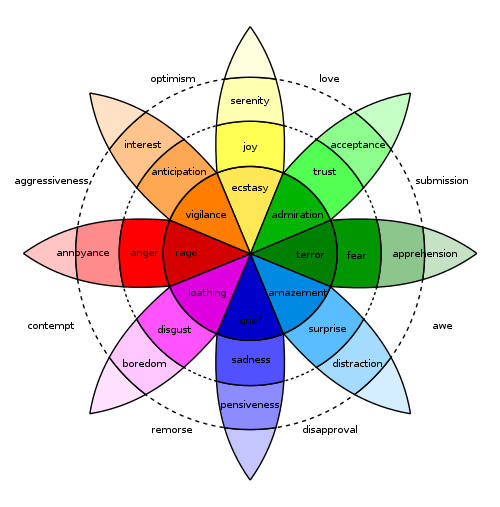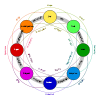Disappointment
Disappointment is the feeling of dissatisfaction that follows the failure of expectations or hopes to manifest. Similar to regret, it differs in that a person who feels regret focuses primarily on the personal choices that contributed to a poor outcome, while a person feeling disappointment focuses on the outcome itself.[1] It is a source of psychological stress.[2] The study of disappointment—its causes, impact, and the degree to which individual decisions are motivated by a desire to avoid it—is a focus in the field of decision analysis,[1][3] as disappointment is, along with regret, one of two primary emotions involved in decision-making.[4][5]
Etymology
Disappoint is traced to the Middle English disappointen by way of the Old French desapointer. In literal meaning, it is to remove from office.[6] Its use in the sense of general frustration traces to the late 15th century, and it first appears recorded in English as an emotional state of dejection in the middle 18th century.[7]
Psychology

Disappointment is a subjective response related to anticipated rewards. Disappointment recovery time depends on the intensity of the disappointment, as well as the person experiencing the disappointment. For some it can take a few minutes while for others the same disappointment can take a few days.
Disappointment, and an inability to prepare for it, has also been hypothesized as the source of occasional immune system compromise in optimists.[8] While optimists by and large exhibit better health,[9] they may alternatively exhibit less immunity when under prolonged or uncontrollable stress, a phenomenon which researchers have attributed to the "disappointment effect".[8] The "disappointment effect" posits that optimists do not utilize "emotional cushioning" to prepare for disappointment and hence are less able to deal with it when they experience it.[9][10] This disappointment effect has been challenged since the mid-1990s by researcher Suzanne Segerstrom, who has published, alone and in accord, several articles evaluating its plausibility. Her findings suggest that, rather than being unable to deal with disappointment, optimists are more likely to actively tackle their problems and experience some immunity compromise as a result.[11]
In 1994, psychotherapist Ian Craib published the book The Importance of Disappointment, in which he drew on the works of Melanie Klein and Sigmund Freud in advancing the theory that disappointment-avoidant culture—particularly therapy culture—provides false expectations of perfection in life and prevents people from achieving a healthy self-identity.[12] Craib offered as two examples litigious victims of medical mistakes, who once would have accepted accidents as a course of life, and people suffering grief following the death of a loved one who, he said, are provided a false stage model of recovery that is more designed to comfort bereavement therapists than the bereaved.[13]
Lacanians considered childhood disappointment essential to entry into the symbolic world of culture;[14] disappointment in adulthood - the frustration of our demands by the world - as key to discovering who in fact we are.[15]
Theory
.jpg)
Disappointment theory, pioneered in the mid-1980s by David E. Bell with further development by Graham Loomes and Robert Sugden,[16] revolves around the notion that people contemplating risks are disappointed when the outcome of the risk is not evaluated as positively as the expected outcome.[17] Disappointment theory has been utilized in examining such diverse decision-making processes as return migration, taxpayer compliance and customer willingness to pay.[18] David Gill and Victoria Prowse have provided experimental evidence that people are disappointment averse when they compete.[19]
Disappointed individuals focus on "upward counterfactuals"—alternative outcomes that would have been better than the one actually experienced—to the point that even positive outcomes may result in disappointment.[20] One example, supplied by Bell, concerns a lottery win of $10,000.00, an event which will theoretically be perceived more positively if that amount represents the highest possible win in the lottery than if it represents the lowest.[21] Decision analysts operate on the assumption that individuals will anticipate the potential for disappointment and make decisions that are less likely to lead to the experience of this feeling.[16] Disappointment aversion has been posited as one explanation for the Allais paradox, a problematic response in expected utility theory wherein people prove more likely to choose a certain reward than to risk a greater reward while at the same time being willing to attempt a greater reward with lower probability when both options include some risk.[22]
While earlier developers of disappointment theory focused on anticipated outcomes, more recent examinations by Philippe Delquié and Alessandra Cillo of INSEAD have focused on the impact of later disappointment resulting when an actual outcome comes to be regarded negatively based on further development; for example, if a person receives higher than expected gains in the stock market, she may be elated until she discovers a week later that she could have gained much more profit if she had waited a few more days to sell.[16] This experience of disappointment may influence subsequent behavior, and, the analysts state, an incorporation of such variables into disappointment theory may enhance the study of behavioral finance.[16] Disappointment is, along with regret, measured by direct questioning of respondents.[23]
See also
- Paris syndrome
- Carnoustie effect
- Frustration
Notes
- Bell, David E. (January 1985). "Putting a premium on regret". Management Science. 31 (1): 117–20. doi:10.1287/mnsc.31.1.117. JSTOR 2631680.
- Ma, Lybi. (March 29, 2004). Down But Not Out. Originally published in Psychology Today. Hosted with permission by medicinenet.com. Retrieved 22/02/08.
- Wilco, W. van Dijk, Marcel Zeelenberg and Joop van der Pligt (August 2003). "Blessed are those who expect nothing: Lowering expectations as a way of avoiding disappointment". Journal of Economic Psychology. 24 (4): 505–16. doi:10.1016/S0167-4870(02)00211-8.CS1 maint: multiple names: authors list (link)
- Wilco W. van Dijk; Marcel Zeelenberg (December 2002). "Investigating the appraisal patterns of regret and disappointment". Motivation and Emotion. 26 (4): 321–31. doi:10.1023/A:1022823221146.
- Wilco W. van Dijk; Marcel Zeelenberg (December 2002). "Investigating the appraisal patterns of regret and disappointment". Motivation and Emotion. 26 (4): 321–31. doi:10.1023/A:1022823221146.
- "disappoint". The American Heritage Dictionary of the English Language, 3rd ed. Houghton Mifflin Company. 1992. p. 529.
- "disappointment". The New Shorter Oxford English Dictionary. 1. Clarendon Press, Oxford. 1993. pp. 683. ISBN 978-0-19-861271-1.
- Schwartz, Todd. (Summer 2003) Positive thinking Archived March 7, 2008, at the Wayback Machine Chronicle, Lewis & Clark College. Retrieved 22/02/08.
- Neimark, Jill. (May/Jun 2007) The optimism revolution Psychology Today. Retrieved 22 February 2008.
- Grohol, John M. (February 4, 2006) Is it best to expect the worst? Psychologists test long-held theory of emotional cushioning. psychcentral.com. Retrieved 22 February 2008.
- Segerstrom SC (September 2006). "How does optimism suppress immunity? Evaluation of three affective pathways". Health Psychol. 25 (5): 653–57. doi:10.1037/0278-6133.25.5.653. PMC 1613541. PMID 17014284.. See also Segerstrom SC (May 2005). "Optimism and immunity: do positive thoughts always lead to positive effects?". Brain Behav. Immun. 19 (3): 195–200. doi:10.1016/j.bbi.2004.08.003. PMC 1948078. PMID 15797306.
- Seale, Clive (2002). Media and Health. London: Sage Publications, Inc. pp. 167, 242. ISBN 978-0-7619-4730-1.
- Seale, p. 167–168.
- W. Ver Eccke, Phenomenology and Lacan on Schizophrenia (2001) p. 181
- P Hill, Lacan for Beginners (London 1997) p. 68
- "Disappointment Without Prior Expectation Cause and Affect" - Understanding emotion in decisions under risk INSEAD (2005). Retrieved 22/02/08.
- Delquié, Philippe; Alessandra Cillo (December 2006). "Disappointment without prior expectation: a unifying perspective on decision under risk". Journal of Risk and Uncertainty. 33 (3): 197–215. doi:10.1007/s11166-006-0499-4.
- See, for example, Why Do People Go Home Again? Disappointment Theory and Target Saving Theory Revisited Archived April 14, 2008, at the Wayback Machine, David Kelsey; Albert Schepanski (1991). "Regret and disappointment in taxpayer reporting decisions: An experimental study". Journal of Behavioral Decision Making. 4 (1): 33–53. doi:10.1002/bdm.3960040104. Archived from the original on 2012-12-10. and Christian Homburg; Nicole Koschate; Wayne D. Hoyer (April 2005). "Do satisfied customers really pay more? A study of the relationship between customer satisfaction and willingness to pay" (PDF). Journal of Marketing. 69 (2): 84–96. doi:10.1509/jmkg.69.2.84.60760.
- Gill, David; Prowse, Victoria (2012). "A Structural Analysis of Disappointment Aversion in a Real Effort Competition" (PDF). The American Economic Review. 102 (1): 469–503. doi:10.1257/aer.102.1.469. JSTOR 41408781. Archived from the original (PDF) on December 30, 2011.
- Schwartz, Alan (2002). "Expected feelings about risky options". In Moore, Simon (ed.). Emotional Cognition: From Brain to Behavior (Advances in Consciousness Research, 44). John Benjamins Publishing Co. pp. 183–96. ISBN 978-1-58811-224-8.
- Bell, David E. (Jan–Feb 1985). "Disappointment in Decision Making under Uncertainty". Operations Research. 33 (1): 1–27. doi:10.1287/opre.33.1.1. JSTOR 170863.
- Jianmin Jia; James S. Dyer; John C. Butler (January 2001). "Generalized disappointment models". Journal of Risk and Uncertainty. 59 (1): 59–78. and Gul, Faruk (May 1991). "A Theory of Disappointment Aversion". Econometrica. 59 (3): 667–86. doi:10.2307/2938223. JSTOR 2938223. For an alternate model of the Allais paradox, see The Allais Paradox at overcomingbias.com.
- Marcatto, Francesco; Donatella Ferrante (January 2008). "The Regret and Disappointment Scale: An instrument for assessing regret and disappointment in decision making". Judgment and Decision Making. 3 (1): 87–99.
Further reading
- Craib, Ian (22 Sep 1994). The Importance of Disappointment. Routledge. p. 216. ISBN 978-0-415-09383-5.
- Loomes, Graham (February 1988). "Further Evidence of the Impact of Regret and Disappointment in Choice under Uncertainty". Economica. 55 (217): 47–62. doi:10.2307/2554246. JSTOR 2554246.
- Mandel, David R.; Denis J. Hilton; Patrizia Catellani (2005). The Psychology of Counterfactual Thinking. Routledge. p. 251. ISBN 978-0-415-32241-6.
External links



